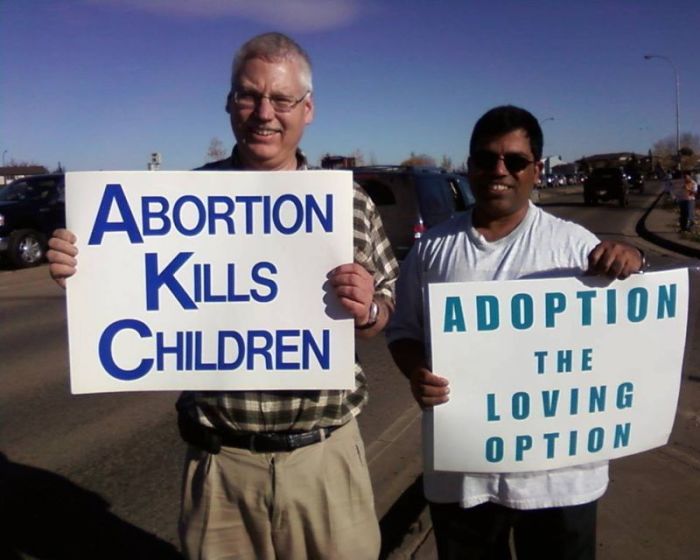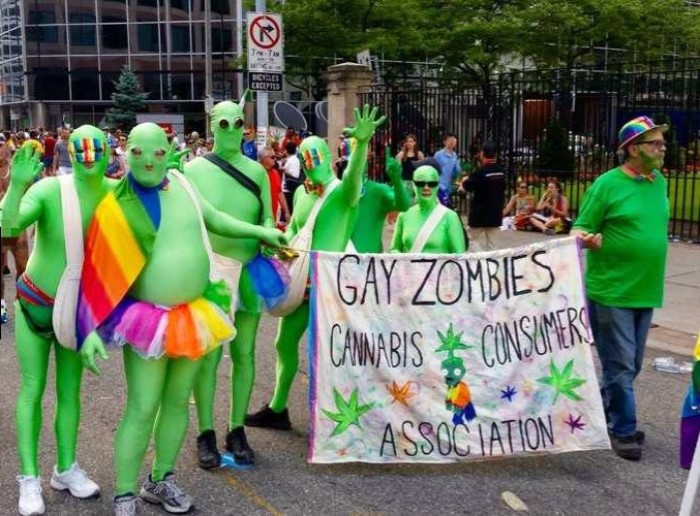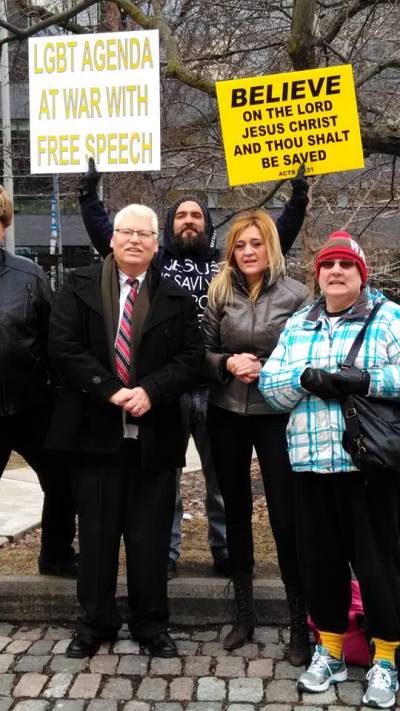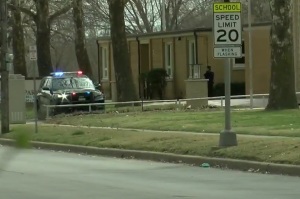Christian Man Facing Prison for Infiltrating Gay Pride Parade Is Ex-Atheist Who Once Hijacked a Bus

Facing the possibility of spending two years in prison for "infiltrating" the 2016 Toronto Pride Parade and passing out over 3,000 flyers detailing the health consequences of homosexuality, Canadian Bill Whatcott is quick to admit that he, too, is a sinner in need of repentance.
Living today as a nationally known conservative activist who's been tied up in a number of prominent legal cases that test the bounds of free speech in Canada, the 50-year-old Whatcott wasn't always conservative and most certainly wasn't always a Christian.
In an interview with The Christian Post on Friday, Whatcott recalled his days as an atheist teenager in the mid to late-1980s living on the streets of various cities in Ontario after being brought up in foster homes.
At that time, Whatcott admits, the only tenable skill he had was getting high off glue. He had no aspirations for the future other than willingly facing the poisonous demise that his glue-sniffing addiction would have brought to his brain cells, organs and ultimately his life.
But thanks to the help of a Christian girlfriend, Christian truckers, Teen Challenge ministries, an Anglican priest who visited him once a week while he was serving 15 months in prison for hijacking a bus, and, of course, God, Whatcott was put on an up-and-down path that ultimately led him to dedicating his life to speaking biblical truth in a highly liberal Canadian society that he says has become more and more anti-Christian over the years.
"Whether I live up to the teachings or not, that doesn't change the authority of Jesus," Whatcott said of his past. "That just means that I am a sinner who needs to be forgiven."
Last month, authorities in Toronto issued a Canadawide arrest warrant for Whatcott over actions he had committed two years ago at Toronto's Pride Parade on July 10, 2016. It was there that Whatcott and a group of friends disguised themselves as green "gay zombies" and passed out 3,000 "safe-sex packages" while marching in the parade.
While many participating in the festivities initially thought the "safe-sex packages" were free condoms, some were upset to find out later that night that those safe-sex packages were packets of information that included the testimony of a former transgender person who's now living his life as a Christian man, as well as a page highlighting the medical risks of homosexual sex and a page denouncing Canada's Liberal Party.
Lastly, the package included a page highlighting the Gospel of Jesus Christ.
The packages drew extreme outrage from the LGBT community, especially considering that Whatcott and his friends used deception to enter themselves as participants in the parade. After it was revealed that Whatcott was the leader of the made-up "Gay Zombies Cannabis Consumers Association" that had registered for the parade, he was hit with a $104 million class-action lawsuit.

Whatcott believes that the gay activists responsible for the lawsuit against him pressured the Canadian attorney general to issue a warrant for his arrest on grounds that he had committed a "hate crime." He believes this was done because their lawsuit has done nothing but "flounder" in court.
Authorities searched for Whatcott in three provinces, looking for him at his home and the homes of his friends and family. While this was going on, Whatcott was working as a bus driver in the oil sands north of Fort McMurray in Alberta, unaware that there had been a warrant issued for his arrest.
After finding out that authorities were searching for him, Whatcott wondered what criminal behavior from his past could have warranted this type of response from law enforcement.
Whatcott turned himself in at a police station in Calgary late last month and he was shocked to learn that he had been charged with a hate crime stemming from the events at the Toronto Pride Parade. He was partly shocked because he knew that case was already being litigated in civil court.
Because of his group's efforts at the Pride Parade, Whatcott was charged under Section 319 of the Criminal Code of Canada. That section prohibits "willful promotion of hatred." The crime is punishable by up to two years in prison.
"I would suggest that they were that threatened because it was the power of the Gospel that indicted their consciences and made them insane," Whatcott said of those who sought to bring charges against him.
Whatcott spent four days in jail in Toronto before being released on bail. He alleges that he spent 24 hours in jail without being given food and deprived of much-needed medication. None of his friends who marched in the parade with him have been charged because Whatcott refuses to give up their names.
His arrest also cost him his job as a bus driver.
Whatcott's four-day stint in jail, however, was far from the first time he has seen the inside of a jail cell.
Hijacking a Bus
Shortly after finding Christ in his teenage years, Whatcott left Teen Challenge ministries and reverted back to his old ways of getting high or drunk on the streets and causing mischief.
In 1987 at the age of 19, Whatcott said that he and a friend hijacked a bus in London, Ontario, while armed with knives. They had the intent of driving the bus into the wall of a local police station. The only problem was that neither Whatcott nor his friend knew how to disengage the air brakes.
"The bus really didn't go anywhere. But we did take a hostage briefly," Whatcott explained. "Then, we got out of this police dragnet of 20 police cars. We were just jumping underneath cars and running through bushes. We somehow evaded them. Once I sobered up and realized the gravity of what I did, I turned myself into the police and took responsibility."
Turning himself in might've saved his life.
Although he was fortunate enough to only get 15 months in prison, Whatcott admits that hijacking a bus should've gotten him at least five to 10 years in prison or more.
"In my view, it was probably God's mercy but it was probably undeserved," Whatcott said.
Things started to change for Whatcott while serving his time at Millbrook Correctional Center.
Although he was able to read the Bible everyday as a "baby Christian," he admits that he still acted in a sinful manner that got him put in segregated detention for six months. He assaulted an inmate, made a weapon, and wrote a death threat to a guard signed in his own blood.
"Even during that time, there were changes because I wasn't enjoying my sin," Whatcott said. "I knew it was sin, where before I thought all that was just fine. I would sleep with a Bible under my head. There was this conflict and I was still doing these horrible things, but on the other hand there were these changes taking place and these horrible things were becoming less tenable."
It was while he was serving his 15 months in prison that Whatcott found himself verbally defending the Christian point of view for the first time. This occurred while he was debating a gay inmate about the immorality of abortion. Whatcott went off what he had learned through a Teen Challenge counselor that abortion was wrong because it's the killing of an unborn human being.
"I remember [the gay inmate] was giving all the arguments about rape and starving children in Africa," Whatcott recalls. "Scripture teaches that life begins at conception and there is never a right reason to murder a human being. We went back-and-forth for about an hour. That was the first time I ever defended the unborn publicly."
Before dating his Christian girlfriend and learning from his Teen Challenge counselor, Whatcott said he had previously supported abortion and saw it as a woman's right to control her own body. He added that having lived on the streets, his political views were largely influenced by social workers, who tend to lean left on social issues.
Before dating the Christian girl, Whatcott admits that his heart was "hard toward God" and he was a "full-blown atheist."
'The Lord Really Sent Him to Me'
While serving his 15 months, an Anglican prison minister named Jim visited Whatcott once a week for about an hour at a time.
"This guy was an evangelical. I believe the Lord really sent him to me," said Whatcott. "He came to visit me every single week at different points during my segregation. I really was going crazy."
"For whatever reason, this guy would say, 'Bill, it doesn't matter what you do. I know God loves and I love you,'" Whatcott continued. "He would pray with me. [Faith was] one thing the institution never took from me back in those days. Today, when I was in jail for this so-called hate crime, I had no access to a Bible until a Salvation Army guy came by and visited me."
After getting out of prison in 1988 at the age of 21, Whatcott went to school and became a licensed nurse. This meant that Whatcott went from being a glue-addicted "street person" to a "relatively mainstream Christian in Toronto" with a comfortable home and a competitive wage in just a few years.
"Once I became a nurse, the abortion issue became very relevant because nurses assist with abortions," he added. "Even in the '90s, sadly even then, there was pressure on nurses to do this without questioning it. As a Christian who believed it was murder, I couldn't quite go along with this rather mainstream train of thought in the health care profession."
More Trouble With the Law
While working as a nurse in Toronto, Whatcott said that he began doing pro-life sidewalk counseling outside of abortion clinics in his spare time. While doing that, he ran into more trouble with the law.
"I was getting arrested for praying in front of abortion clinics. My treatment by the courts was a lot more harsh for that," Whatcott recalled, adding that he was arrested a total of 20 times between 1994 and 1999 for his pro-life advocacy.

Many of the cases involved the fact that he picketed with signs that had graphic depictions of aborted babies.
"I pretty much won those cases and wore down the courts, and they pretty much decided that graphic abortion signs were legally protected speech, which [the abortion lobby] was trying very hard to keep those signs off the streets," Whatcott said. "They would send massive amounts of resources after me when I was picketing with those signs to get me off the street and away from the clinics."
While some of Whatcott's stints in jail for pro-life advocacy lasted just one day, some lasted a couple of weeks or more. In September 1994, he was sent to prison for six months for his pro-life advocacy.
"That became my Prison Fellowship ministry," Whatcott said of his six months at the Maplehurst Correctional Complex. "When I went into prison for praying for the unborn, I was no longer making knives. I was no longer fearful and wasn't trying to be tough. I was actually leading Bible studies."
Of the 65 inmates in his unit at Maplehurst, Whatcott said that 25 of them would come to his cell for Bible studies and prayer.
"Some of those inmates were homosexuals and gangbangers. When I got out of jail, I gave them my number. A couple of them showed up at my church and two of them became picketers at the abortion clinics," he said.
Whatcott was able to keep his job as a nurse despite being arrested so many times, mainly because his nursing manager in Toronto turned a blind eye to his pro-life efforts and would let him take unpaid leaves of absence anytime he was sent to jail. Many pro-lifers in the nursing profession, he added, are not as fortunate.
Whatcott said that he eventually gave up nursing as a full-time profession to focus more on his pro-life sidewalk ministry. He would work his nursing job one or two days a week and picket abortion clinics the other four days of the week.
When Whatcott moved to Saskatchewan in 1999, he started working within the Regina Health District. However, his pro-life advocacy was met with much more opposition there.
"In 2002, they went after my nursing license. I was in the news a lot," he said. "I was going with abortion signs all over Saskatchewan and picketing at the hospital where they were doing abortions, which also happened to be my employer. I never went back to nursing but I fought it right up to the Supreme Court and I actually won but it took eight years."
Despite the victory, Whatcott never went back to nursing because that would've required him to go back to school to learn the new practices and advancements over the eight years that he was away from the practice.
Back in Court
Although Whatcott spent many years devoted to serving the Lord through his pro-life sidewalk ministry, he shifted his attention to voicing his biblical opposition to Canada's embrace of homosexuality and other issues encompassed within the LGBT agenda.

Because of his advocacy, Whatcott again wound up back in court in 2013. This time he was being sued over flyers he distributed that criticized the Saskatchewan public school system for "promoting" homosexuality.
Although he won his case before the Saskatchewan Court of Appeal, the Canadian Supreme Court took up the case in 2013 and ruled against Whatcott and in favor of the Saskatchewan Human Rights Commission.
"Really, if you disagree with the promotion of sodomy in public schools, you can be found guilty of hate speech, which is really sad," Whatcott told CP of the 2013 ruling.
Whatcott, who attends a church affiliated with the Lutheran Church – Canada, was back in court yet again in Toronto on Monday, where a judge set a hearing for Sept. 20 in the Pride Parade case.
Whatcott and his lawyer asked the court to require disclosure from the attorney general's office as to why the order was issued and why he was arrested.
He added that his criminal charges have the fingerprints of LGBT activist lawyer Doug Elliott and openly gay politician George Smitherman all over them.
"They weren't going anywhere with their [class-action] lawsuit [against me] and this was the last kick at the can," Whatcott said. "The Liberals lost the election, they were vacating office. They really weren't happy that they didn't get their pound of flesh out of me yet. The very fact that the civil litigants are on my bail condition as people that I can't talk to ... it tells me that it's the same people's hands on it."
Whatcott said that he decided to turn himself in to face the charges because this is a case worth fighting.
"We need religious liberty in this country to be able to speak freely," Whatcott asserted.
September will be a big month for Whatcott as he will also appear before the British Columbia Human Rights Tribunal on Sept. 10–13 for a case lodged against him by Morgane Oger, a transgender activist who became the first transgender person to run for provincial office in 2017.
Oger filed a complaint against Whatcott last year claiming that flyers he passed out questioning Oger's fitness for public office because of the candidate's gender identity violated Section 7 of British Columbia's human rights code prohibiting "hatred and contempt." The clause was added to the province's human rights code in 2016, according to The Vancouver Star.
If found guilty, Whatcott could face $75,000 in fines.
Whatcott's wife launched an online crowdfunding campaign on GoGetFunding.com. It has raised over $21,000 thus far. A funding campaign posted on GoFundMe for the Whatcotts was removed after LGBT activists complained, and the money returned to donors.





























